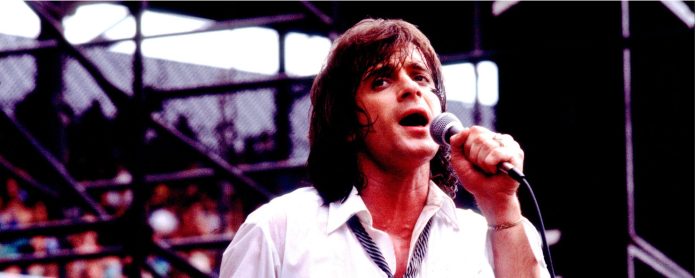The world of music lost one of its most likable and resilient performers when Eddie Money passed away in 2019 at age 70. Money not only delivered the goods with his many hits over the years, but he also proved to be one of rock and roll’s best (and funniest) storytellers.
For example, there’s the one where he angered Hollywood screen legend Doris Day. He avoided Day’s lawyers and came away with his first-ever Top 40 hit in the process.
From Waking a Beat to Keeping the Beat
Eddie Money very nearly became Officer Maloney (his real birth surname). Money’s grandfather and father had both served as policemen in New York City. The future rocker joined the force briefly. But he never got much further than the clerical level before deciding that growing his hair long meant more to him than walking the beat.
Luckily, Money had music as a fallback plan. He’d been singing since he was a kid and performing in bands since his teenage years. Like so many others in the late 60s and early 70s, he decided that California was the place to be to start a music career. He relocated to San Francisco.
It was tough sledding for him for a while. But Money eventually gained the approval of San Francisco music impresario Bill Graham. Graham helped secure Money a deal with Columbia Records, for whom he recorded his self-titled debut album in 1977.
On “Hold”
By the time Eddie Money received the opportunity to record, he had put together an excellent backing band within the San Francisco area. He used those musicians to help him put together the debut record. His lead guitarist, Jimmy Lyon, helped him write many of the songs on the record, including what would turn out to be the first hit.
Money thought that “Two Tickets To Paradise”, which he had written by himself, was the surefire lead single. But the record company thought otherwise, which is why he and Lyon went back to the drawing board and came up with “Baby Hold On”. Lyon came up with the guitar riff that drove the song, while Money handled the lyrics.
The song, both rocking and romantic, took off, landing at No. 11. Money was later vindicated in his belief in “Two Tickets To Paradise”, which also went to the Top 25 as the follow-up. But it turns out “Baby Hold On” gained a little bit too much exposure. It caused a darling of the silver screen to come calling.
Day’s Demands
In the chorus of “Baby Hold On”, Eddie Money sings, “Whatever will be, will be/The future is ours to see.” If that sounds familiar, you’re probably thinking of similar lyrics within the song “Que Sera, Sera (Whatever Will Be, Will Be)”, a 1956 hit sung by Doris Day in the suspense movie The Man Who Knew Too Much.
Needless to say, Day certainly found the lyrics familiar as well. According to Money, he was greeted at home one day by a lawyer from the Day estate, claiming they were going to sue him. Money managed to plead ignorance and escaped any legal action.
Although he probably would have missed the royalties, it wouldn’t have been catastrophic to him if the songwriting credits to “Baby Hold On” ended up including the names of Jay Livingston and Ray Evans, the pair that wrote “Que Sera, Sera”. After all, it would have given Money another great story to tell.
Photo by Paul Natkin/Getty Images






